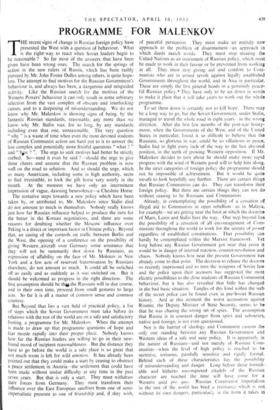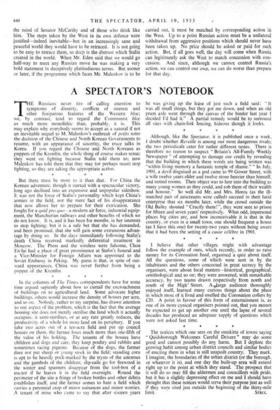PROGRAMME FOR MALENKOV
THE recent signs of change in Russian foreign policy have presented the West with a question of behaviour. What is the right- way to react when Soviet leaders begin to be reasonable ? So far most of the answers that have been given have been wrong ones. The search for the springs of action in the new rulers of Russia, which has been rashly pursued by Mr. John Foster Dulles among others, is quite hope- less. The attempt to find motives for the Russian Government's behaviour is, and always has been, a dangerous and misguided activity. Like the Russian search for the motives of the Western Powers' behaviour it can only result in some arbitrary selection from the vast complex of obscure and interlocking causes, and to a deepening of misunderstanding. We do not know why Mr. Malenkov is showing signs of being, by the fantastic Russian standards, reasonable, any more than we know why Mr. Stalin was, for so long, by any standards including even that one, unreasonable. The very question " why " is a waste of time when even the most devoted students of Russian Communist action are hard put to it to answer the less complex and potentially more fruitful questions " what ? " and " b^V'w ? ". The urge to seek motives had better be strictly curbed. So—need it even be said ?—should the urge to give three cheers and assume that the Russian problem is now well on the road to solution. And so should the urge, which so many Americans, including some in high authority, seem to find irresistible, to look the gift horse very sourly in the mouth. At the moment we have only an intermittent impression of vague, dawning benevolence—a Cheshire Horse.
The tentative steps towards a new policy which have been taken by, or attributed to, Mr. Malenkov since Stalin died do not amount to much in themselves. Nobody really knows just how far Russian influence helped to produce the turn for the better in the Korean negotiations, and there are some reasons for doubting whether the Moscow influence over Peking is a direct or important factor in Chinese policy. Beyond that, an easing of the controls on traffic between Berlin and the West, the opening of a conference on the possibility of giving Western ,aircraft over Germany some assurance that they will not be summarily shot down by Russians, an expression of affability on the face of Mr. Molotov in New York and a few acts of reserved fraternisation by Russians elsewhere, do not amount to much. It could all be switched off as easily and as suddenly as it was switched on. But it should be welcomed as progress in the right direction. The first assumption should be till, the Russian's will in due course, and in their own time, proceed from small gestures to large acts. So far it is all a matter of common sense and common courtesy.
But teyond that lies a vast field of practical policy, a list of steps which the Soviet Government must take before its relations with the rest of the world are on a safe and satisfactory footing, a programme for Mr. Malenkov. When the attempt is made to draw up that programme questions of hope and fear recede rapidly into their proper place. Nobody knows how far the Russian leaders are willing to go in their new- found mood of incipient reasonableness. But the distance they have to go before the world is a safe place is so great that not much room is left for wild emotion. It has already been pointed out that they could make a start by ceasing to obstruct a peace settlement in Austria—the settlement that could have been made without undue difficulty at any time in the past seven years. But that is only a start. They must withdraw their forces from Germany. They must transform their influence over the East European satellites from one of semi- imperialistic pressure to one of friendship and, if they wish, of peaceful persuasion. They must make an entirely new approach to the problem of disarmament—an approach in which deeds match words. They must stop treating the United Nations as an instrument of Russian policy, which must be made to work in their favour or be prevented from working at all. They must stop giving aid and comfort to Com- munists who are in armed revolt against legally established Governments throughout the world, and in Asia in particular. These are simply the first general heads in a genuinely peace- ful Russian policy.• They have only to be set down in words to make it plain that it will take years to work out the whole programme.
To set them down is certainly not to kill hope. There may be a long way to go, but the Soviet Government. under Stalin, managed to travel the whole road in eight years- -in the wrong direction. After the first few months of the post-war honey- moon, when the Governments of the West, and of the United States in particular, found it so difficult to believe that the Russians, so glorious in war, could he so villainous in peace, Stalin had to fight every inch of the way to the last abysmal position, in the teeth of growing Western opposition. If Mr. Malenkov decides to turn about he should make more rapid progress with the wind of Western good will to help him along. In the strict categories of foreign policy the programme should not be impossible of achievement. But it would be quite unsafe to look hopefully any further. There are certain things that Russian Communists can do. They can transform their foreign policy. But there are certain things they can not do without ceasing to be Russians and Communists.
Already, in contemplating the possibility of a cessation of illegal aid to Communists in open rebellion—as in Malaya. for example—we are getting near the limit at which the doctrine of Marx, Lenin and Stalin bars the way. One step beyond lies the possibility of a cessation of all encouragement of Com- munists throughout the world to work for the seizure of power regardless of established constitutions. That possibility can hardly be contemplated within the Marxist framework. Yet long before- any Russian Government got near that point it would be in danger of internal reaction, counter-revolution and chaos. Nobody knows how near the present Government has already come to that point. The decision to release the doctors so recently imprisoned and to turn the weapons of Soviet law and the police upon their accusers has suggested the most electric possibilities to the close students of Russian Communist behaviour, but it has also revealed that little has changed in the bad basic situation. Tangles of this kind within the web of the secret police can be found even in pre-Soviet Russian history. And at this moment the worst accusation against Riumin, the Deputy Minister of State Security, seems to bo that he was chasing the wrong set of spies. The assumption that Russia is in constant danger from spies and saboteurs, native and foreign, is not even questioned.
Nor is the barrier of ideology and Communist custom the only one standing between any Russian Government and Western ideas of a safe and sane policy. It is apparently in the nature of Russians—and not merely of Russian Com- munists—when the level of high policy is reached to be secretive, tortuous, painfully sensitive and rigidly formal. Behind each of these characteristics lies the possibility of misunderstanding and danger. Long before these formid- able and hitherto unconquered citadels of the Russian character are reached the time will have come for a Western quid pro quo. Russian Communist imperialism in the rest of the world has bred a resistance which is not without its own dangers. particuiar:y in the form it takes in



































 Previous page
Previous page